Apr 13, 2025 – Farming, Buddha’s Birthday Lantern Lighting Ceremony
Hello. Today is the 56th day of Venerable Pomnyun Sunim’s 100-Day Dharma Talk. It feels like we just started, but eight weeks have already passed. Today, after farming at Dubuk Retreat Center, Sunim traveled to Seoul to participate in the lantern lighting ceremony ahead of Buddha’s Birthday at the Jungto Social and Cultural Center.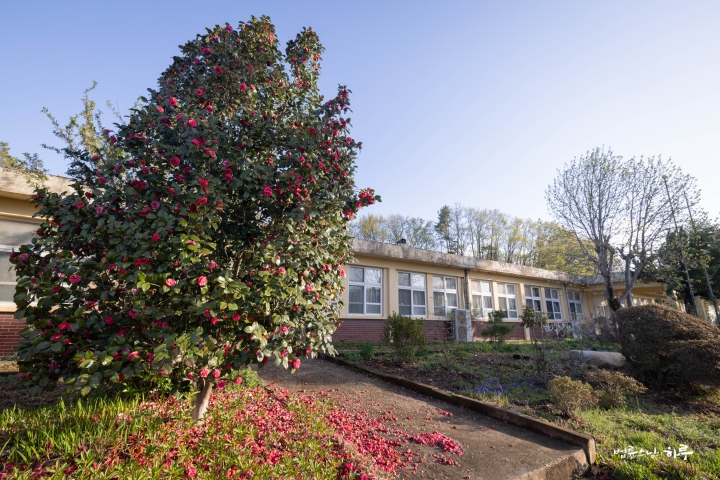
Sunim began farming after completing his morning practice and meditation. The early morning rain and strong winds had left the garden in disarray. The lettuce seedlings and coriander seeds planted two weeks ago showed no signs of sprouting, while weeds flourished.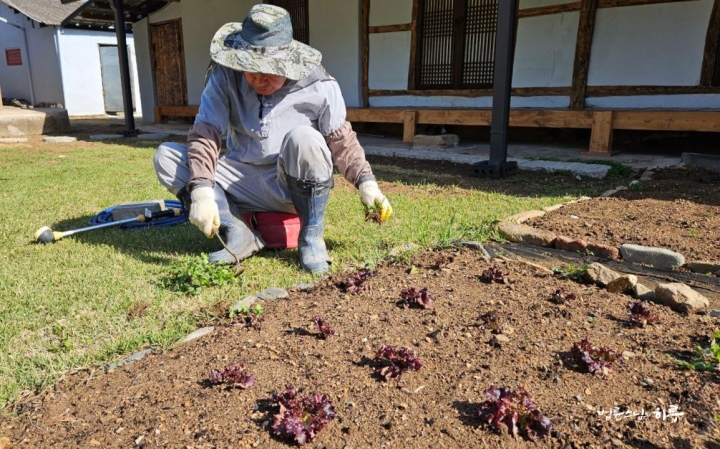
After weeding, Sunim harvested the coriander planted last winter. He washed and trimmed it neatly before finishing the farm work.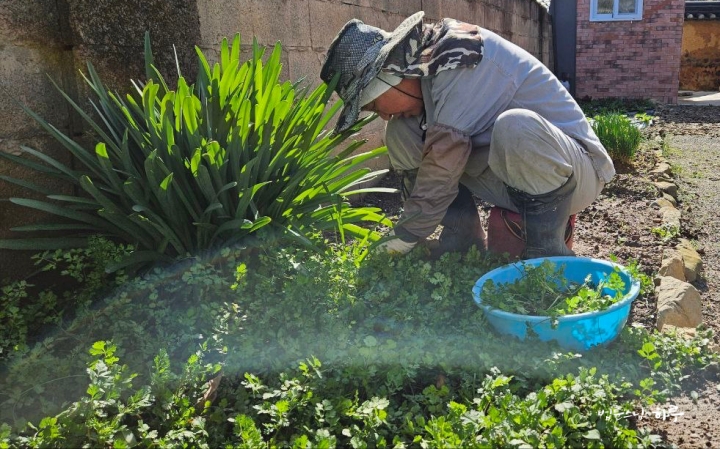
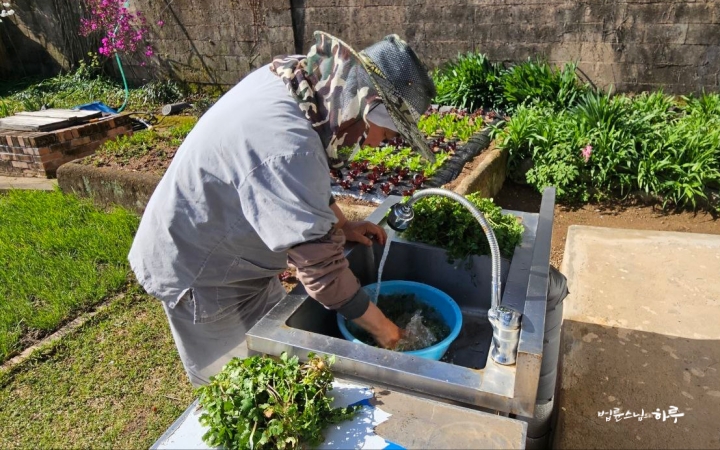
Despite the cool breeze, spring was blooming everywhere. Throughout the Dubuk Retreat Center, flowers were quietly emerging.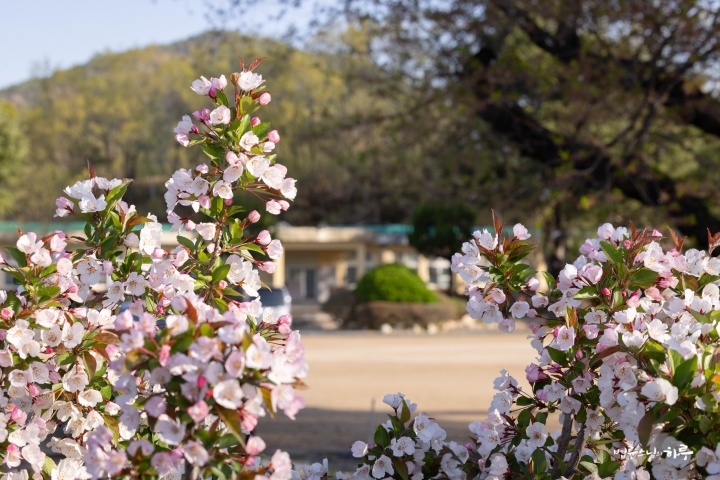
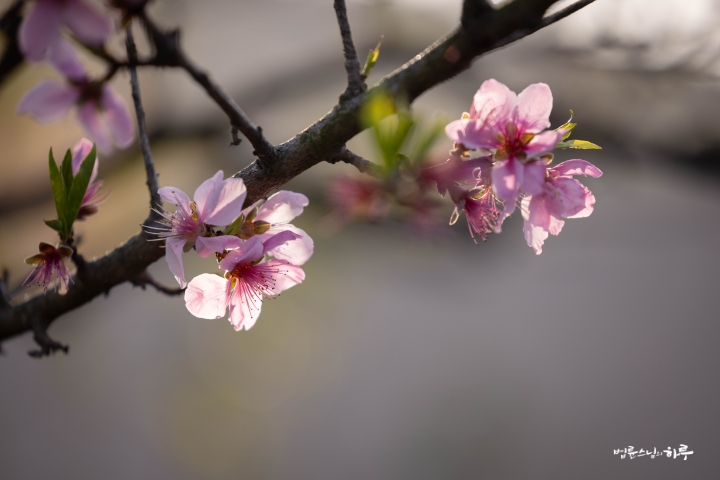
After lunch, Sunim departed for Seoul at 2 PM.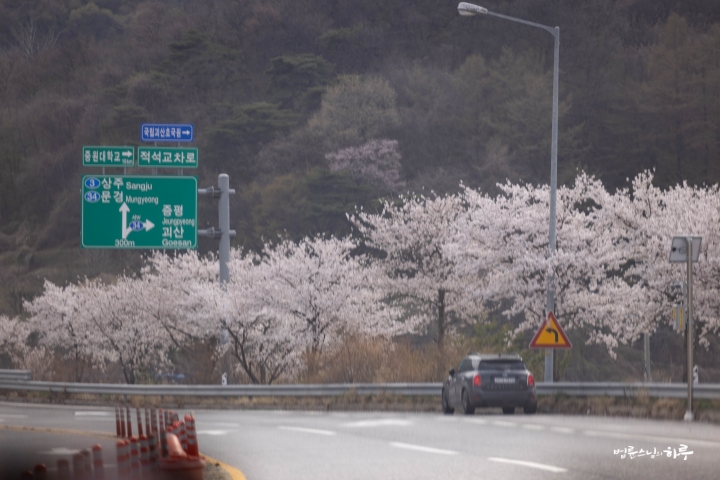
Though Sunim had enjoyed feeling the spring energy while farming over the weekend, his body was quite tired. He took a nap as the car traveled along the highway.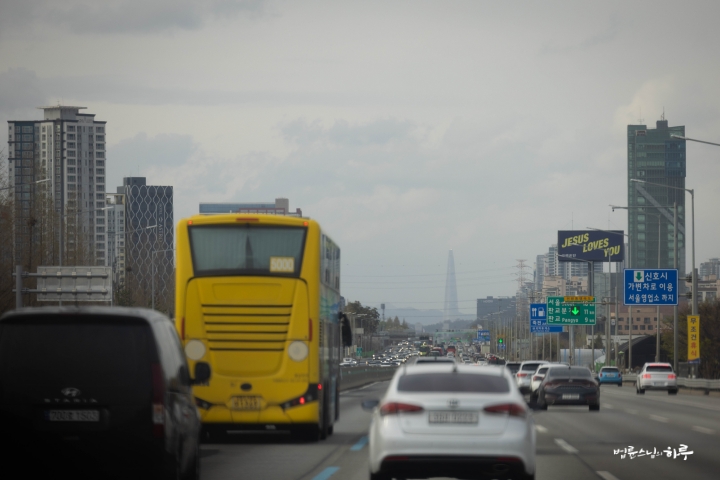
Due to traffic, Sunim arrived at the Seoul Jungto Social and Cultural Center after 6 PM. As the sun set, preparations for the lantern lighting ceremony, a month ahead of Buddha’s Birthday, were in full swing in the courtyard.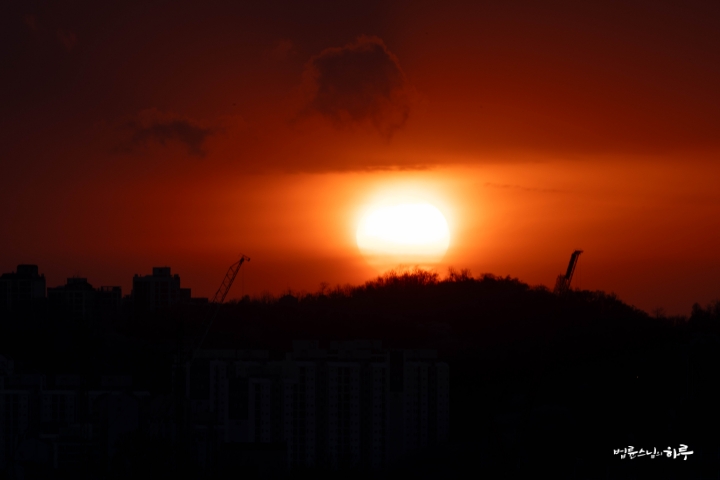
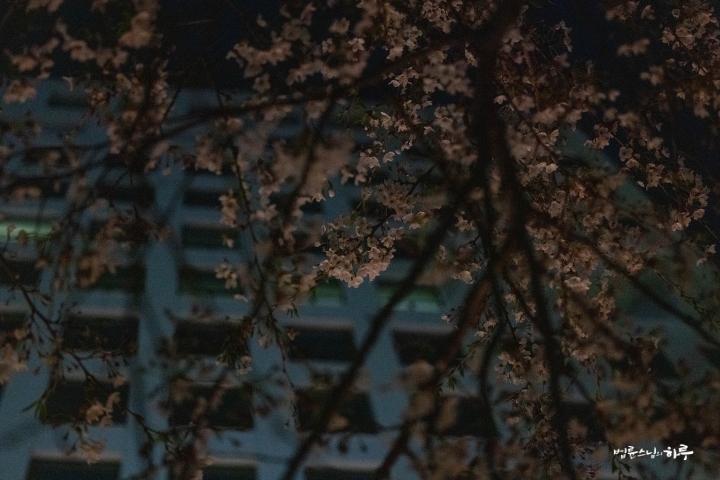
After completing preparations for lighting the lanterns, the ceremony began at 7 PM sharp in the third-floor Dharma Hall. About 300 Jungto Society members gathered, aspiring for peaceful minds and a world filled with hope. Jungto Society members from around the world, along with their families and those who had sponsored lanterns, joined the ceremony via online livestream.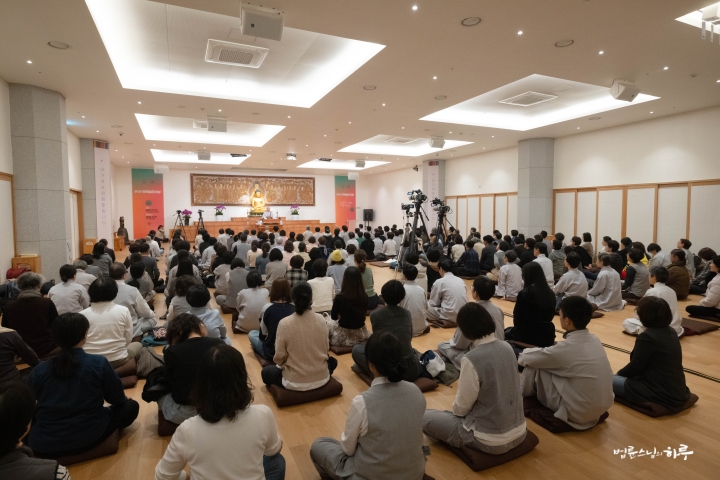
After the President of Jungto Society’s greeting, the assembly requested teachings with three bows, and Sunim gave a Dharma talk about the significance of the lantern lighting ceremony before Buddha’s Birthday.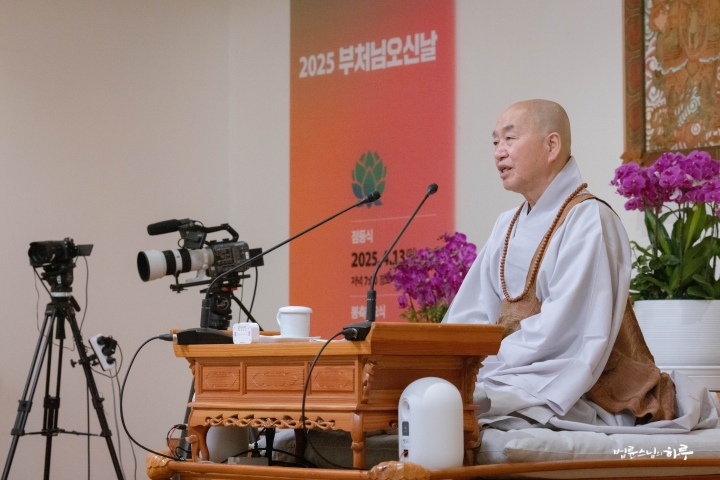
“Today we are holding a lantern lighting ceremony to meaningfully welcome the upcoming Buddha’s Birthday. Every year as Buddha’s Birthday approaches, we light lanterns that illuminate the darkness. What is the significance of this? Generally, darkness symbolizes ‘ignorance,’ while light represents ‘wisdom.’ The Buddha taught that all suffering of sentient beings stems from ignorance. Therefore, anyone who awakens from ignorance can live without suffering. Awakening from ignorance is precisely what ‘wisdom’ means. Just as light dispels darkness, we aim to eliminate all our suffering by attaining wisdom. Wisdom is also called ‘joyeon’, which means ‘to illuminate and see.’ It means ‘to see everything as it is.’ Thus, we light lanterns with the meaning of wisdom embedded in the light.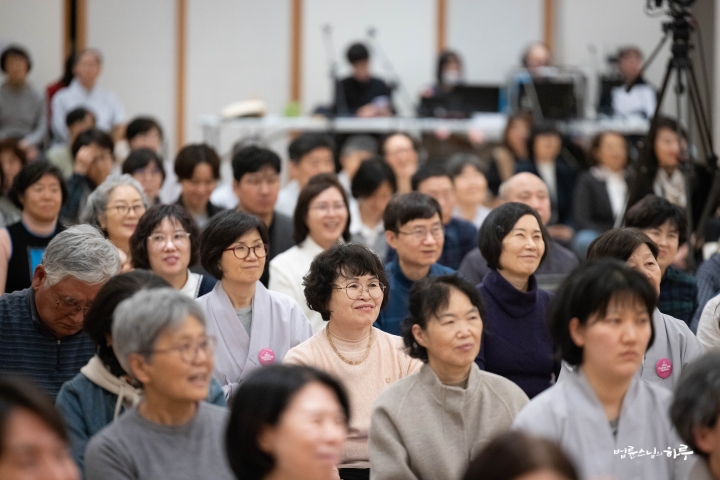
Why We Light Lanterns Before Buddha’s Birthday
A lamp’s value shines brightest when lit in the dark night. Similarly, wisdom like a lamp is most needed by ignorant sentient beings. Therefore, the Buddha’s teachings exist for the benefit of sentient beings. The Buddha’s teachings serve as excellent medicine for sentient beings to awaken from ignorance and live without suffering. In a hospital, the patients, not the doctors, are the main focus, as hospitals exist to treat patients’ illnesses. However, in reality, things often become inverted, with hospitals becoming money-making tools for doctors. This is called ‘inversion.’ Similarly, in schools, students should be the focus since schools are places of learning. But when teachers become the focus, schools become places of teaching, inverting the proper relationship. Likewise, in Buddhism, sentient beings don’t exist for the Buddha; the Buddha exists for sentient beings. ‘Buddha’ means being the master of one’s own life. That’s why in Buddhism, there is no culture of declaring oneself a servant of the Buddha. The Buddha’s teachings are like a lamp guiding us on the right path to awaken from ignorance. It is with this meaning that we light lanterns today.
The reason we hold the lantern lighting ceremony a month before Buddha’s Birthday is to announce its approach. We light lanterns around temples and along streets to inform people that Buddha’s Birthday is coming soon. This might inspire those who don’t usually visit temples to consider visiting on Buddha’s Birthday, generating interest in Buddhism. As the saying goes, ‘seeing gives rise to thought’ – whatever we see and hear naturally stirs our minds. Lighting lanterns throughout the streets becomes an opportunity for spreading the Dharma. Thus, the act of lighting even one lantern becomes an act of spreading the Dharma. The intention we generate is called ‘balsim’ (generating the mind), and this is the starting point of spreading the Dharma.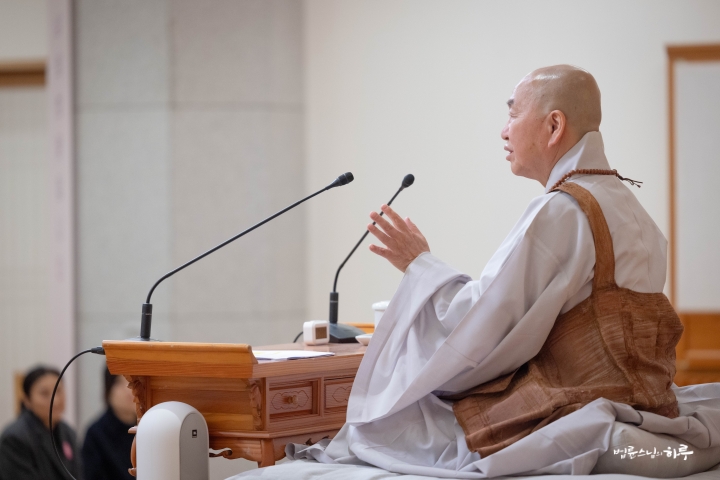
Even if people become interested in Buddhism, they might find it burdensome to enroll in the Jungto Dharma School. However, lighting a lantern is considered a way to accumulate merit and feels less intimidating. Therefore, we can ensure that the donations people make when lighting lanterns are used effectively where needed, allowing them to genuinely create good karma. We can provide food aid to earthquake victims in Myanmar and malnourished children in North Korea, or support reconstruction efforts in Syria, where long-term civil war has destroyed all infrastructure.
Most people are too busy with their daily lives to pay attention to situations in other countries. So they ask, “Sunim, how can you continuously generate such compassion?” I feel this way because I have witnessed these situations firsthand. When I visited the border regions between China and North Korea, I saw the bodies of North Korean residents floating down the Yalu and Tumen Rivers. Among those who managed to cross the rivers alive, many were reduced to skin and bones, which pained my heart deeply. When you see such people, distinctions about nationality disappear, and you only think about providing water, food, clothing, shelter, and medicine necessary for survival. Of course, some people impose conditions like “I’ll give you food if you believe in God” or “I’ll help you if you memorize a Bible verse.” However, I believe we should not discriminate based on religion, nationality, ethnicity, ideology, or gender when dealing with people in survival crises. They are simply people who need water, food, clothing, medicine, and at least temporary shelter. We must cultivate the heart to help them escape from the suffering of basic survival. 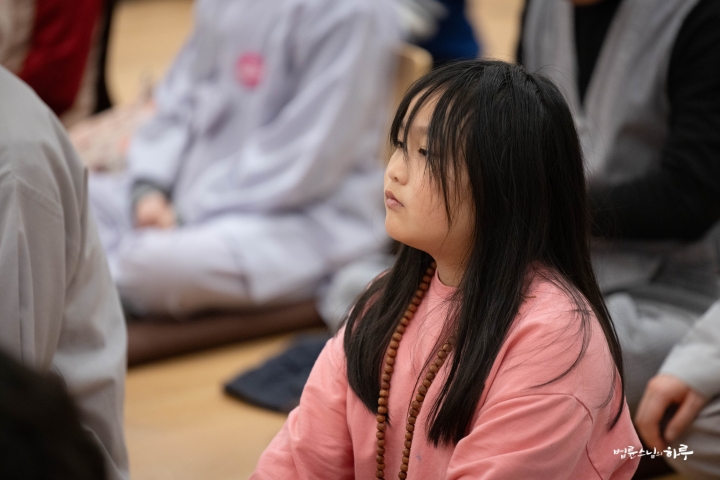
With the Mind of Lighting the Lamp of Wisdom and Compassion
Wisdom means ‘seeing things as they are.’ When we see things as they are, the question ‘What can I do to help?’ naturally arises within us. This mindset is like reaching out to someone drowning in water, without expecting anything in return. This is ‘compassion.’ Wisdom and compassion are not separate; when there is wisdom, compassion follows, and without wisdom, there is no compassion. If compassion is lacking, it is because we are not seeing things as they truly are.
The Buddha’s teachings are like a lamp of wisdom that illuminates our ignorance. When we light this lamp and view the world through the eyes of wisdom, we can see the suffering of people in the world. This naturally gives rise to compassion, the desire to alleviate their suffering, even if only a little. This compassion manifests as actions like giving and service. That is why the lanterns we light on Buddha’s Birthday are called the ‘Lamp of Wisdom’ and the ‘Lamp of Compassion.’ 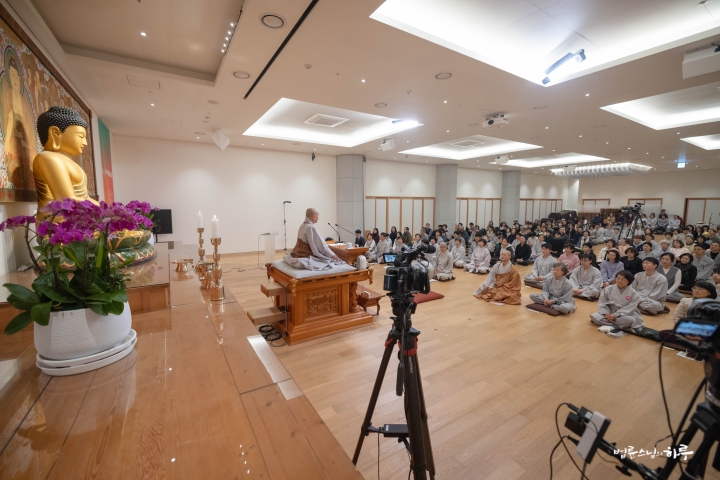
Praying for Peace on the Korean Peninsula, National Unity, and Sustainable Development
Look at how the United States is waging a tariff war right now. They don’t distinguish between allies and adversaries. They pursue only their own national interests, evaluating international relationships solely based on trade figures. The global trade market is rapidly changing in this way.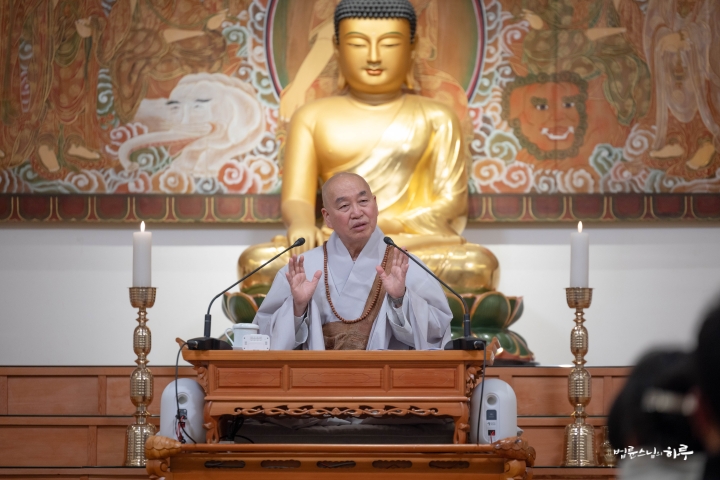
Throughout human history, the gap between the rich and poor has become extreme. Even during the Buddha’s time, wealthy elders indulged in luxury and pleasure. The Buddha sought a path where everyone could live without suffering. Though born a prince, he could have easily been drawn to luxury and pleasure. However, upon seeing the contradiction where one must die for another to live, the Buddha chose to abandon his status and wealth. With the awareness that contradictions must be fundamentally resolved, he left home, practiced diligently, attained enlightenment, and taught throughout his life. We are the people who follow in the footsteps of the Buddha who lived such a life.
The Buddha presented five precepts as universal values that everyone should uphold. The first of these five precepts is to not resolve problems through violence. This is the precept of non-killing, which instructs us not to use force to solve problems. War, in particular, must be prevented due to its devastating violent consequences. Today, we face both the risk of war between South and North Korea and the potential conflict between the United States and China. As the world’s superpowers clash, South and North Korea risk becoming the frontline of this conflict. To prevent the devastation of war and bring peace to Northeast Asia, we must engage in dialogue with North Korea, with China who supported North Korea during the Korean War, and with Japan who caused us such suffering during colonial rule. Without dialogue, peace cannot be achieved. 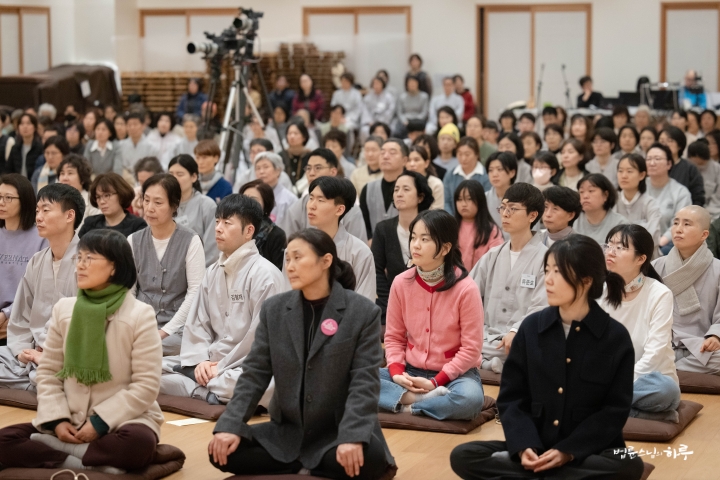
So, on Buddha’s Birthday, the first lantern we should light is for peace on the Korean Peninsula and in Northeast Asia. To light the lantern of peace, we must not be consumed by past grievances. We need to move beyond extremist thinking. Looking at internet comments, both right-wing and left-wing extremists are equally violent in their language. When they disagree with something, they inflict indiscriminate verbal violence regardless of which side they’re on. If you suggest cooperating with Japan, you’re denounced as a ‘native Japanese collaborator,’ and if you advocate dialogue with North Korea, you’re labeled a ‘pro-North Korean communist.’ We must break free from this extremist mindset. For peace, we need dialogue and cooperation with everyone—North Korea, Japan, China, and the United States alike.
Second, we must light the lantern for national unity. Dialogue has broken down not only with other countries but also within our own nation. The legislators elected by the people cannot even talk to each other in the National Assembly. They’re preoccupied with hurling accusations like ‘pro-North Korean communist’ or ‘rebellion sympathizer’ at each other. This is how our national discourse becomes increasingly divided. When such extremist thinking crosses national boundaries, it creates the risk of war; within the country, it poses the danger of civil war. We need to calm the hostility toward one another and achieve national unity. To accomplish this, we must see each other as partners in dialogue. We are all citizens of the same Republic of Korea, not enemies. How can we achieve national unity if we treat the other side as something to be eradicated?
Third, we must light the lantern for the sustainable development of the Republic of Korea. This year, Korea’s economic growth rate is expected to be less than 1 percent. We have entered a complete stagnation phase. The gap between rich and poor continues to widen. It’s not just the common people’s economy that’s struggling, the entire national economy is in difficulty. This is a situation where everyone, regardless of political affiliation, needs to put their heads together. For sustainable economic growth, we need to discuss inter-Korean cooperation and find solutions to overcome U.S. tariff barriers. We have far more important issues at hand than just focusing on internal problems. With the December 3rd martial law crisis resolved through the impeachment verdict against the president, we’ve overcome a major hurdle in the political chaos. Of course, many issues remain, but from a national perspective, there are critical matters that demand attention. Even when there’s conflict within a household, if a major crisis occurs outside, the entire family must cooperate. In this sense, the current period requires cooperation with the national interest in mind.
It is fortunate that the risk of war on the Korean Peninsula has subsided. In religious terms, this could be called the Buddha’s blessing. While tensions on the Korean Peninsula have fortunately eased, domestic conflicts have worsened instead. On Buddha’s Birthday, I hope we all adopt the attitude of lighting the lanterns of peace, national unity, and sustainable national development. Let us light the lantern of wisdom to overcome our ignorance, the lantern of compassion to help those suffering around the world, the lantern of peace to prevent the misfortune of war, and the lanterns of national unity and sustainable national development for the benefit and cooperation of the entire community. I hope we light today’s lanterns with these thoughts in our hearts.” 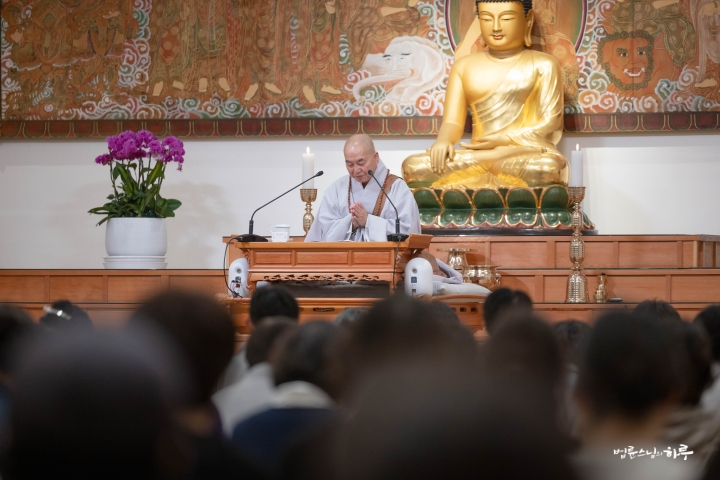
After the Dharma talk ended, Sunim moved to the courtyard in front of the first floor of the center to continue with the lantern lighting ceremony.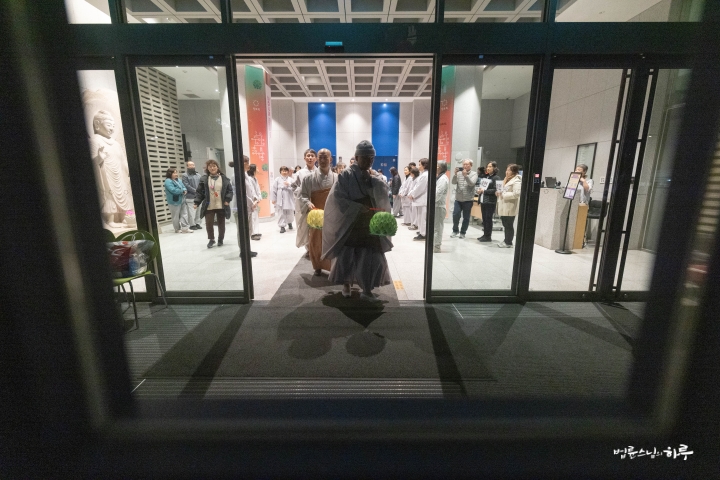
While moving, the Bodhi Tree Choir sang Buddhist hymns. The background video showed various parts of the Jungto Social and Cultural Center where the 100-Day Dharma Talk was taking place. Following this, everyone watched a video showing how each of the main temples of Jungto Society was preparing for Buddha’s Birthday.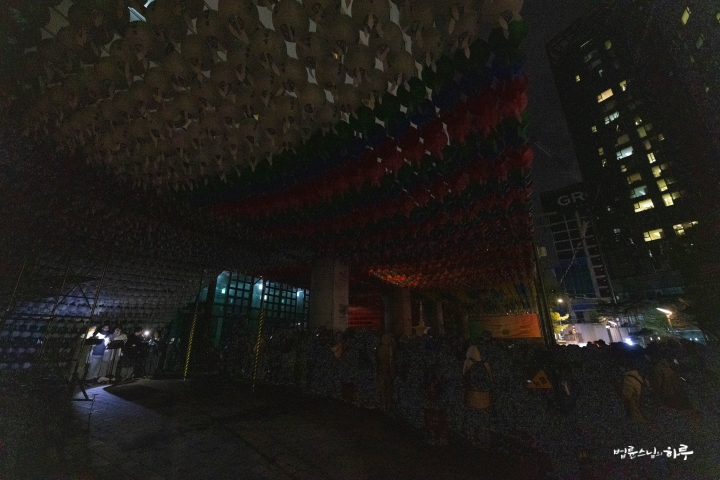
As everyone watched the video, the atmosphere of the lantern lighting ceremony grew more festive. In the dark courtyard, Sunim led the recitation of the Bodhisattva’s vow. The audience joined in, reading the subtitles displayed on the live broadcast screen.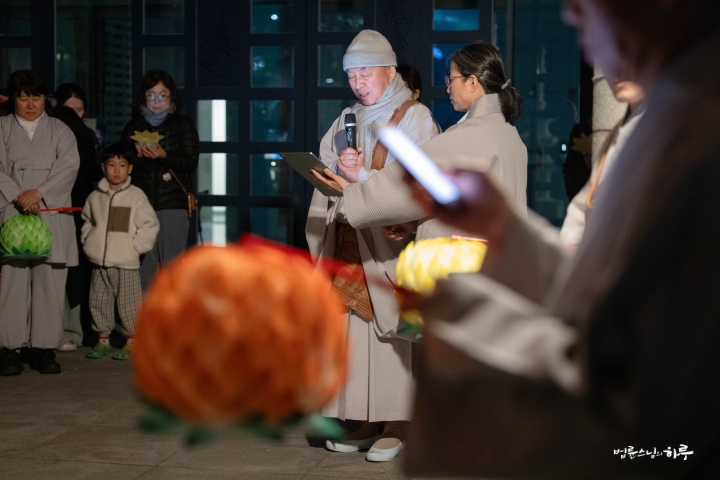
“Oh Buddha, I am poor and have nothing to offer you, so I light this small lamp. Though this lamp is humble, by this merit, may I surely attain Buddhahood in my next life.” 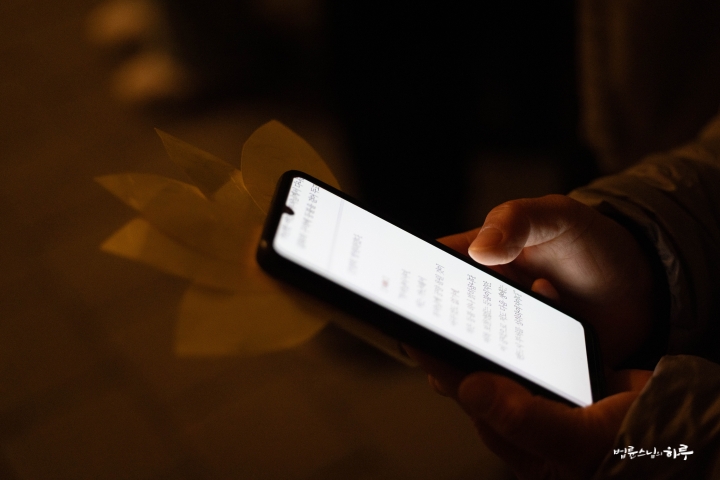
The next part of the ceremony was the lighting of lanterns, symbolizing the hope that the light of peace would illuminate the world. Everyone joined together with one heart to light their lanterns. Following the MC’s lead, the audience chanted enthusiastically:
“Peace of mind!”
“Hope for the world!”
With these shouts, the lanterns were lit one by one above their heads. As the lights on the pagoda and the main lantern were turned on, the approximately 300 people surrounding the pagoda also lit their individual lanterns.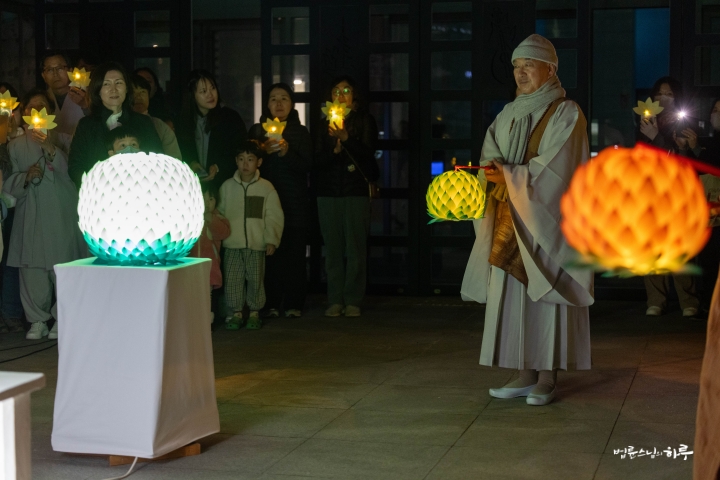
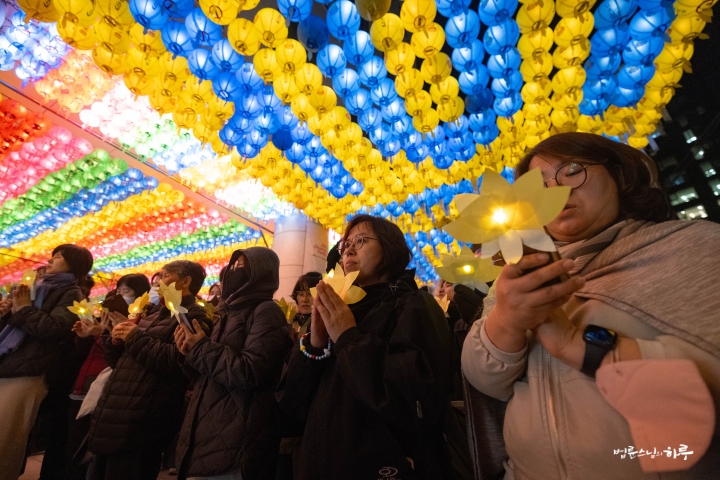
One by one, the lights illuminated the darkness, quietly transforming the space.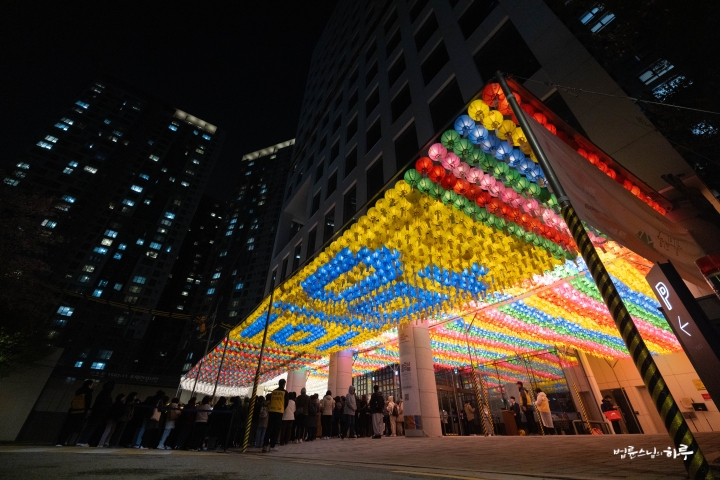
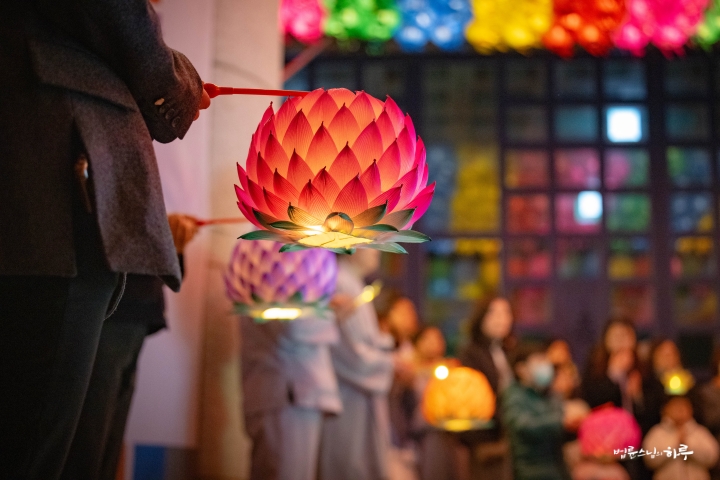
Under the colorful lanterns, everyone earnestly wished that such bright light would fill the entire world. Jungto Society members watching the live broadcast online also lit lanterns in their own homes.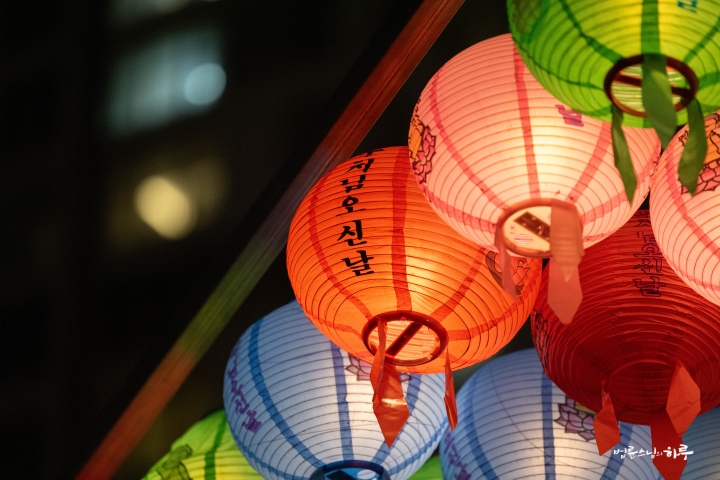
Next, everyone circumambulated the pagoda while chanting Shakyamuni Buddha. Together, they prayed for Buddha’s teachings to spread throughout the world and into the future. Led by Sunim, the procession included Venerable Yusu, the President of Jungto Society, the Secretary General, Venerable Jajae representing the Yeonhwa Association, the head of the Special Youth Division, and a child representative symbolizing the future generation.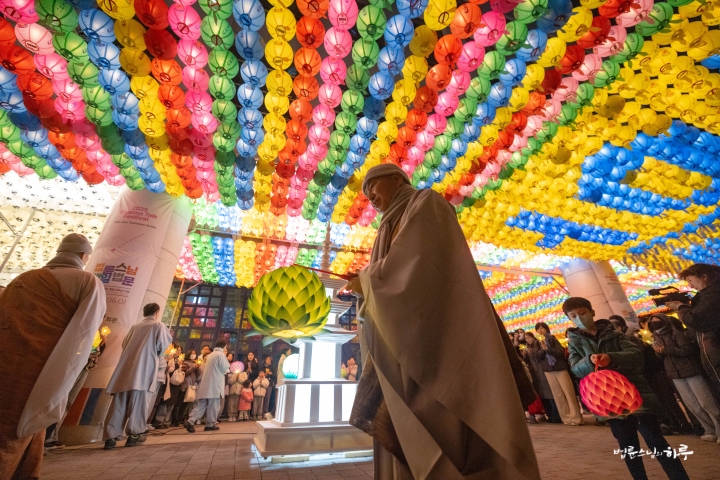
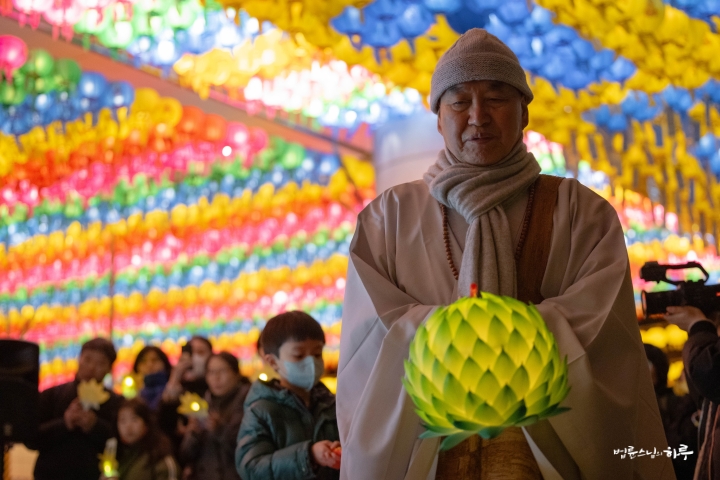
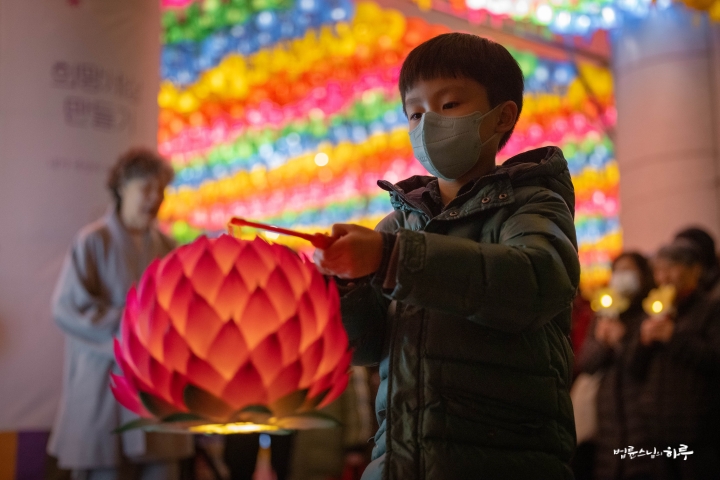
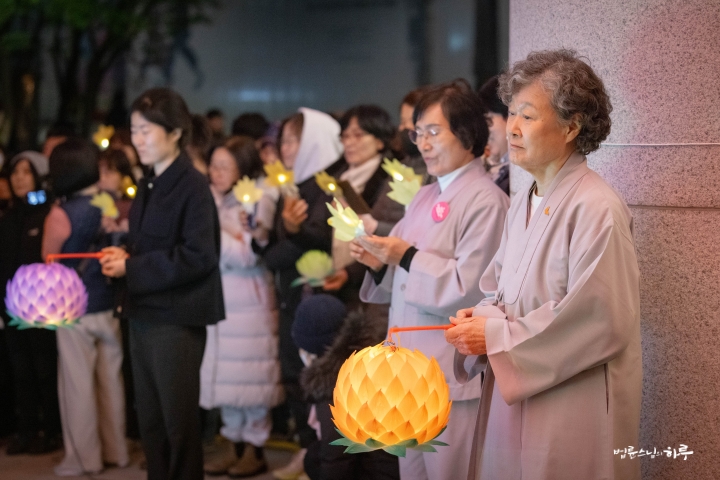
After singing the Buddhist hymn ‘Lantern’ together, Sunim recited Buddha’s prophecy.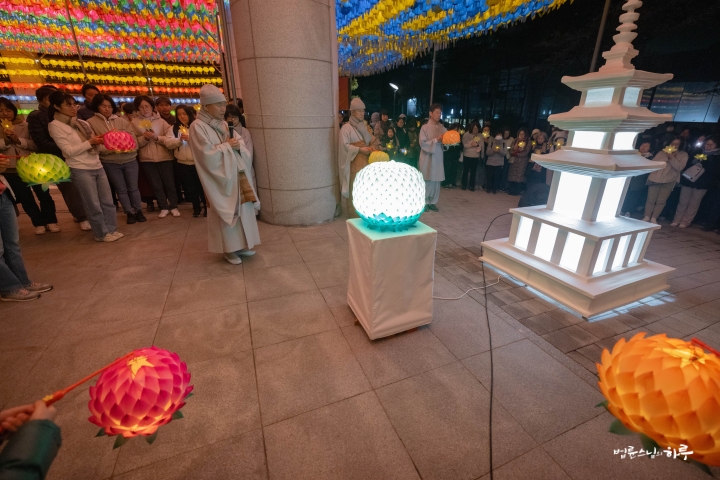
“Ananda, do not worry needlessly. That lamp was lit with the vast vow and sincerity of a poor but kind-hearted woman. Though it is a small lamp, it will never be extinguished. By the merit of lighting this lamp, after thirty kalpas, she will surely become a Buddha. And her name will be ‘Sumideng Guangrulai’ (Tathagata of Sumeru Lamp Light).” 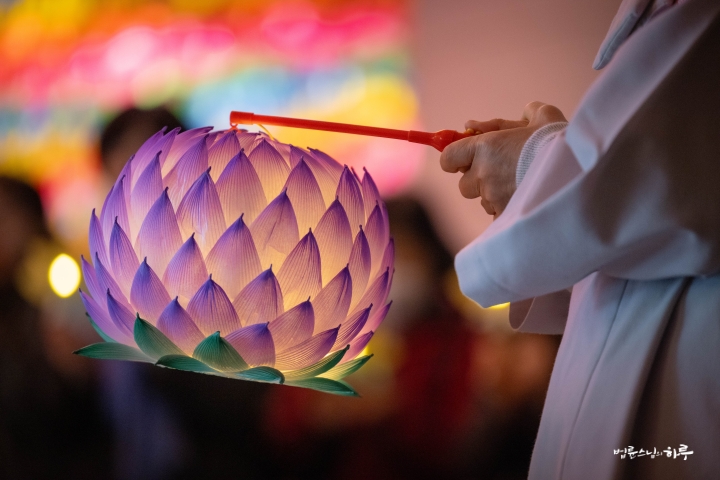
Sunim then offered a blessing prayer.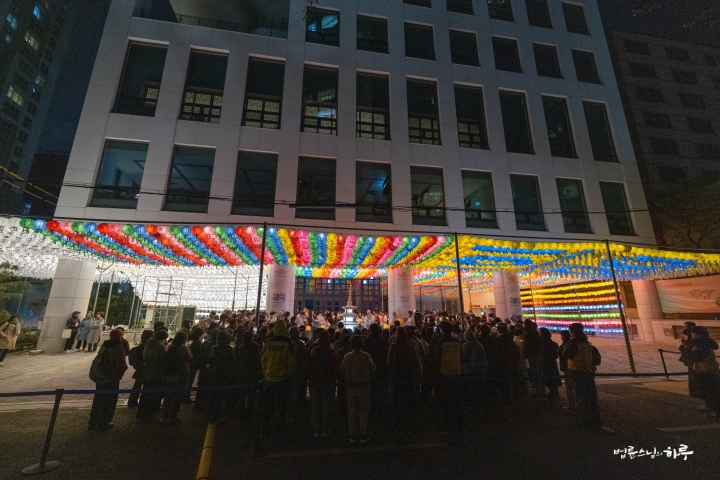
“The Buddha, with infinite wisdom, guided ignorant beings to a world free from suffering. Today, we light the ‘Lamp of Wisdom’ symbolizing the Buddha’s wisdom. The Buddha also extended his compassionate hand to those who were thirsty, hungry, naked, and sick, helping them escape from suffering. So today, we light the ‘Lamp of Compassion’ so that many people living in suffering in this world may be freed from their pain.
Today, the world is becoming increasingly chaotic. Conflicts and wars are breaking out in many places. The Korean Peninsula contains the potential danger of war at any time. Therefore, we light the ‘Lamp of Peace’ with the wish that war will never again occur on this land.
The Republic of Korea is currently in severe conflict with a divided public opinion, reminiscent of a civil war. Citizens are treating each other as enemies to an extent that makes it hard to believe they belong to the same country. Therefore, we light the ‘Lamp of National Unity’ to soften hostile feelings and help citizens unite as one. 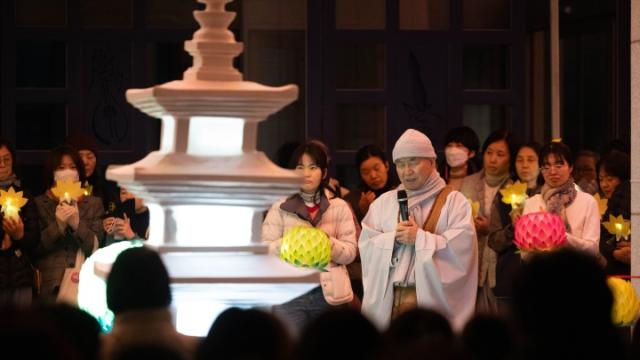
Looking back on the past century, we have diligently worked through countless difficulties to create today’s Republic of Korea. We reclaimed our lost country, rose from the ashes of war, and became a global economic power. We also overcame harsh dictatorships to establish an advanced democracy that draws worldwide attention. Furthermore, the Korean Wave is sweeping across the globe, with Korean culture capturing the attention of people worldwide. Despite our potential to make greater contributions to humanity based on these achievements, our country’s growth potential has nearly been exhausted. We pray that we do not miss this golden opportunity to contribute to human society in the 5,000-year history of the Republic of Korea. Therefore, we wish to light ‘a lamp praying for the sustainable development of our nation’.
Today, many members of the Jungto Society join their hands in this prayer. May all Buddhas and Bodhisattvas bear witness to this aspiration and help it be fulfilled, and may all heavenly guardians protect and support the realization of this prayer. Namu Shakyamuni Buddha, Namu Shakyamuni Buddha, Namu Shakyamuni Buddha.” 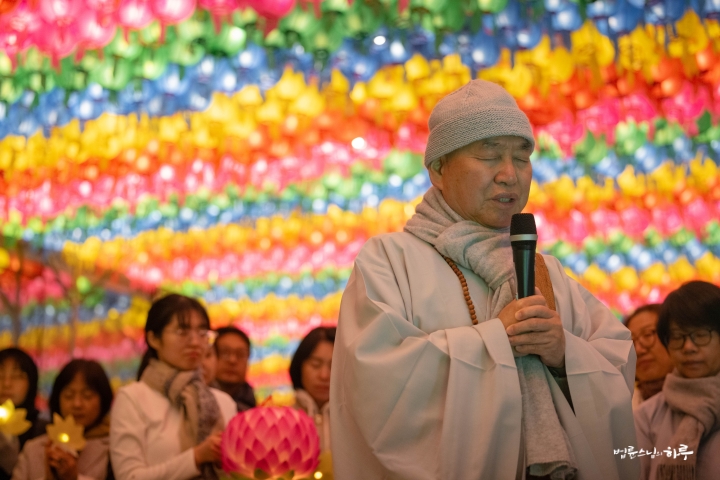
Just as lanterns illuminate the darkness, the hearts of Jungto Society members united in their desire to shine light on the world. Sunim’s blessing made the lantern lighting ceremony an even more meaningful occasion.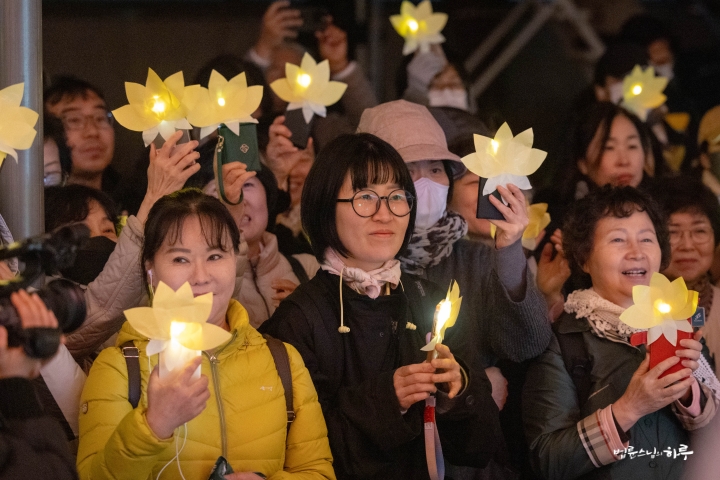
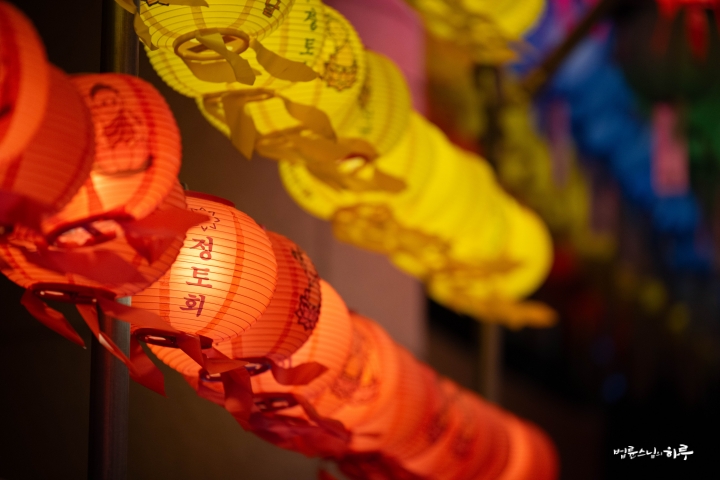
After reciting the Four Great Vows and singing the closing song together, the lantern lighting ceremony for Buddha’s Birthday in the Buddhist year 2569 came to an end.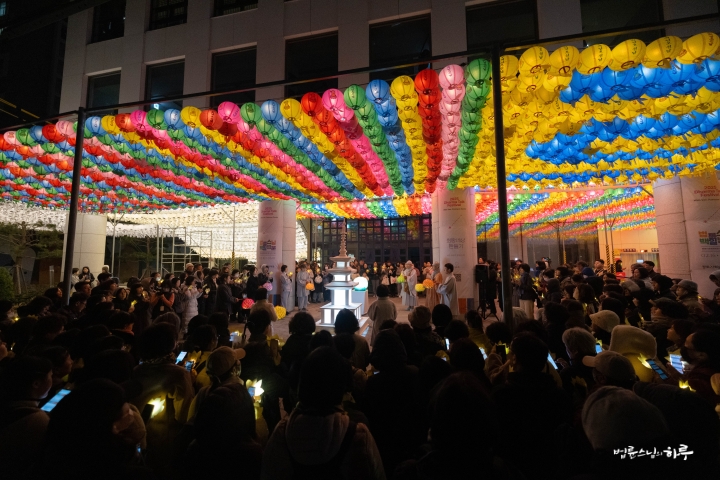
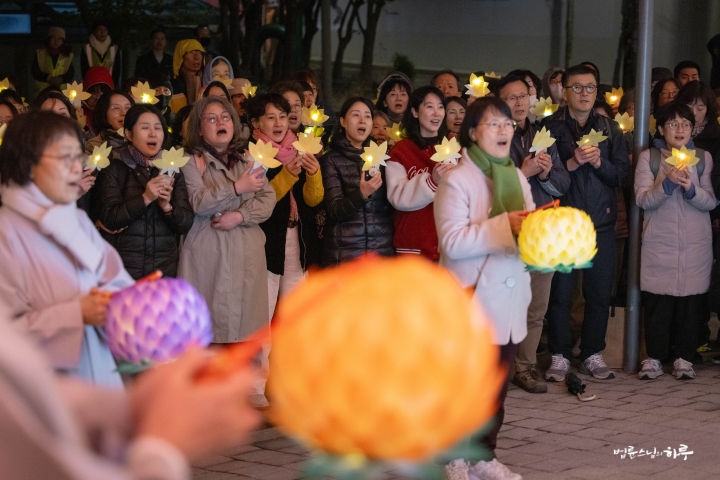
Under the lantern lights, members of the Sangha gathered in small groups to take commemorative photos, each inscribing their personal vows in their hearts.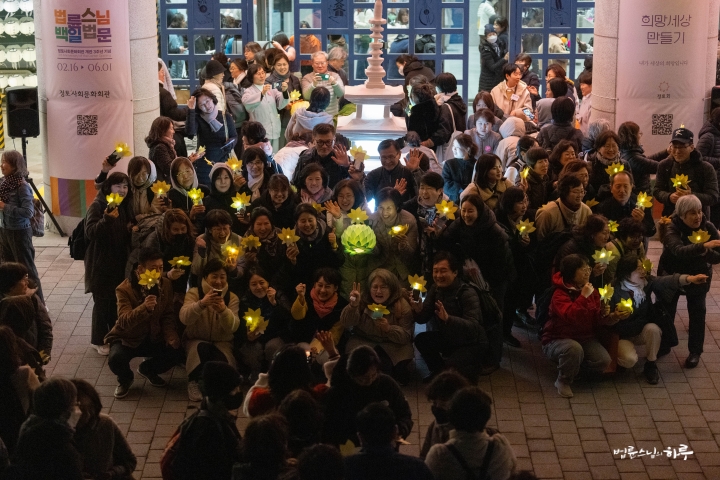
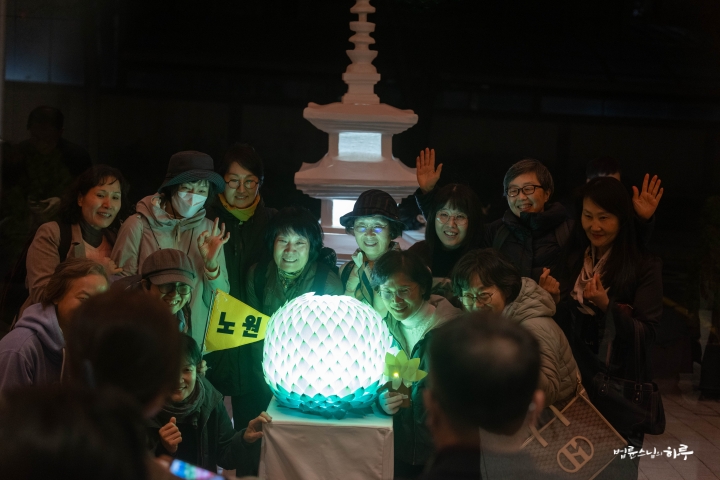
Tomorrow will be the 57th day of the 100-Day Dharma Talk. In the morning, Sunim will give the 11th Sutra lecture at the Dharma Hall on the 3rd floor of the Jungto Social and Cultural Center, and in the evening, he will conduct the 11th Buddhist Social Studies Course lecture in the main auditorium in the basement.
How Has Sunim Built Trust with People to Win Their Hearts?
Jun 28, 2025. - INEB Day 3, Visit to Bongamsa Temple, Discussion on Practice




